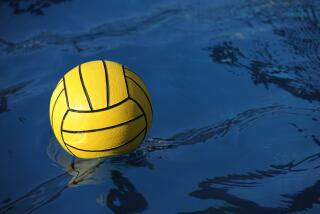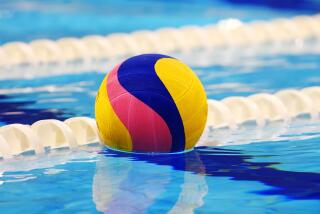Changes Expected for U.S. Water Polo
- Share via
IRVINE — The Atlanta Olympics were supposed to be the perfect showcase for water polo in the United States. Fueled by a nationalistic fervor, the U.S. team expected to challenge for a medal.
But about the only splash the United States made was disastrous. Upset at a referee during a quarterfinal game against Spain, Chris Humbert splashed water toward the official. Humbert, the team’s leading scorer, was ejected and the U.S. team eventually lost, 5-4.
That Spain went on to beat Croatia--a team the Americans beat in pool play--for the gold medal doesn’t take away the sting of a seventh-place finish, the worst for the United States since it finished seventh in 1976.
Against that disappointing backdrop, U.S. Water Polo is conducting its annual meeting Thursday through Sunday at the Orange County Airport Hilton. Ninety delegates will gather to elect officers and form committees.
Everyone will have an opportunity to tour U.S. Water Polo’s new national training center at 12:30 p.m. Saturday at the Los Alamitos Armed Forces Reserve Center. The training center was ready for use in late June and the national team practiced there for about a month before the Olympics.
This is the organization’s first meeting under a new set of bylaws, so much of the business will revolve around adjusting to the new rules, officials said. The bylaws call for more balanced representation nationwide, an attempt to reduce the traditional domination of the organization by Californians and boost the sport nationally.
“It’s probably going to be one of the more volatile meetings we’ve had because there are so many new people,” said Richard Foster, an Irvine attorney who is the president. “Then again, it might be less volatile. It’s hard to say.”
At issue will be the budget. Because of the team’s poor finish in Atlanta, U.S. Water Polo lost about $500,000 it expected to receive from the U.S. Olympic Committee in the next four years.
The organization is also facing other decisions, although they aren’t expected to be resolved this week. Among them:
* Hiring a new coach. Rich Corso has decided to step down and at least eight people are seeking to replace him. The front-runners appear to be Steve Heaston, the coach at Cal, and John Vargas, coach at Corona del Mar High and assistant coach for the U.S. team the last four years.
Candidates will be interviewed by a selection committee next month and the organization is hoping to name a coach by Oct. 1.
* Residence program vs. professional program. Most of the U.S. players spent the last 3 1/2 years training together, a longer span than usual for U.S. teams. It was a less-experienced group, with only a handful of former Olympians, so it probably benefited from staying together.
“It’s pretty tough to assess what the results are,” said Bruce Wigo, executive director of U.S. Water Polo. “The bottom line was bad, there’s no question about it. But this is not Dream Team basketball. There’s a lot of parity in international water polo.”
Some believe players could grow more by playing professionally in European leagues, which offer the world’s toughest competition except for the Olympics and world championships.
“Maybe the answer is not residency,” Wigo said. “Maybe it’s getting them hardened in Europe. The Europeans play in front of thousands of people every weekend. Our guys get a chance to do that--never. Or rarely in this country.”
Another answer, Wigo said, might be a professional league in this country. Such a league would probably be based in California, Wigo said. “You have to start somewhere,” he said. “Who would have thought beach volleyball would be such a draw 10 years ago? Maybe we are at that stage.”
More to Read
Go beyond the scoreboard
Get the latest on L.A.'s teams in the daily Sports Report newsletter.
You may occasionally receive promotional content from the Los Angeles Times.





